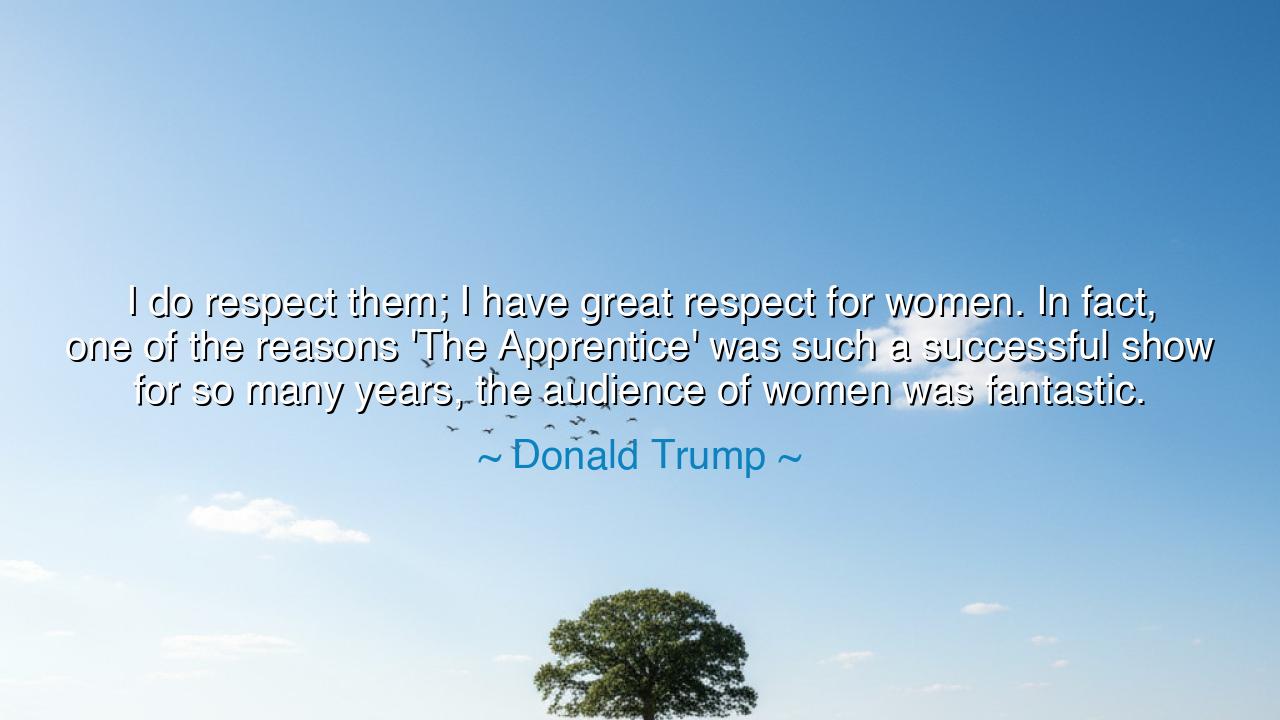
I do respect them; I have great respect for women. In fact, one
I do respect them; I have great respect for women. In fact, one of the reasons 'The Apprentice' was such a successful show for so many years, the audience of women was fantastic.






In the words of Donald Trump, there lies a reflection upon recognition and influence: “I do respect them; I have great respect for women. In fact, one of the reasons ‘The Apprentice’ was such a successful show for so many years, the audience of women was fantastic.” At first glance, the statement seems simple — an acknowledgment of appreciation — but beneath its surface, it holds a truth about mutual respect, influence, and the power of connection between leaders and those they reach. It is a reminder that no enterprise, no success, and no voice rises alone. Every achievement is sustained by those who choose to listen, to watch, and to believe.
The meaning of these words extends beyond admiration; it speaks to the understanding that respect is the foundation of enduring influence. Trump’s acknowledgment of women — not merely as supporters, but as essential to the success of his work — reflects a broader principle: that true leadership is reciprocal. Those who create, lead, or inspire must honor those who sustain their vision. Respect is not given out of obligation but out of recognition — recognition of the power, intelligence, and loyalty of those who stand alongside you. In this sense, his statement can be seen as a lesson on gratitude and awareness — that success thrives where respect abides.
The origin of this quote arises from Trump’s reflections on his television legacy, particularly the success of The Apprentice, a program that for many years captivated audiences across nations. He attributes part of that success to the enthusiasm of women — a recognition that their engagement and discernment were vital to the show’s impact. But beyond television, the statement mirrors an age-old truth: that the strength of any endeavor, whether political, artistic, or personal, rests on the unseen pillars of support — in this case, the viewers who believed, the audience who stayed. To “respect” them, therefore, is not only a statement of personal sentiment but an acknowledgment of dependence and shared power.
The ancients too understood this bond between the leader and the people. In the stories of old, we find Pericles, the statesman of Athens, who ruled not through fear but through persuasion and respect for the citizens who gave him his voice. He knew that the greatness of Athens was not his alone but that of the men and women who sustained its spirit. Likewise, Trump’s reflection — though set in the modern stage of media and commerce — echoes this ancient principle: that no leader, no creator, no empire stands without the devotion of its people. And devotion, once given, must be met with reverence and acknowledgment.
But the statement also carries a moral undertone — a reminder that respect is not rhetoric; it is action. To say “I respect them” is the beginning, not the end, of duty. Words must be shaped into deeds, as the ancients taught through the example of Cyrus the Great, who honored all peoples under his rule, ensuring their customs and rights were preserved. Respect is not shown through flattery but through fairness, not through praise but through practice. For respect that is not embodied becomes mere performance, fading like smoke after the applause. The wise understand that to truly respect others — women, men, or any group — is to recognize their dignity and worth in all circumstances, not only in moments of shared success.
In this light, Trump’s acknowledgment of his audience reveals a truth about the interdependence of recognition and respect. The audience, particularly the women he speaks of, were not passive spectators but participants — shaping, affirming, and amplifying his work. This dynamic mirrors the timeless relationship between the individual and the collective, where creation and appreciation feed one another like flame and air. Without this bond of respect, influence collapses into vanity. But when respect flows both ways — from the leader to the people and from the people to the leader — greatness endures.
The lesson, therefore, is simple yet profound: respect is the lifeblood of human connection. Whether you are a leader, a creator, or a member of any community, never forget those who make your success possible. Honor them with sincerity, and let your gratitude shape your actions. Speak with kindness, listen with patience, and act with fairness. Respect is not owed to power — it is owed to humanity. For when we respect others, we affirm their worth, and in doing so, we elevate our own.
So let these words of Donald Trump serve as a reflection for future generations: to respect others is to recognize the shared threads of destiny that bind all achievement to the hands of many. Let us move through the world not as tyrants seeking applause, but as stewards of trust and acknowledgment. For respect, once given sincerely, multiplies endlessly — and where it reigns, both success and dignity find their home.






AAdministratorAdministrator
Welcome, honored guests. Please leave a comment, we will respond soon